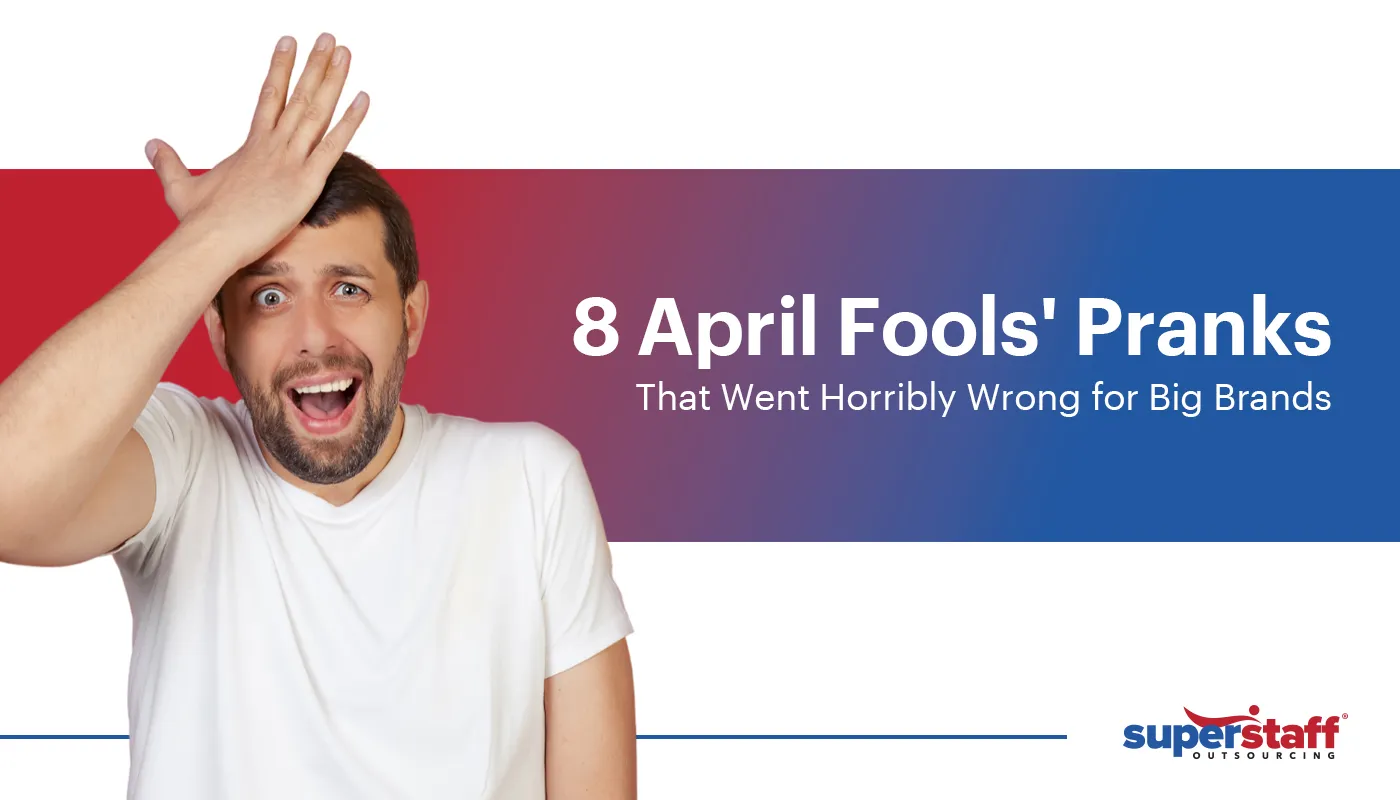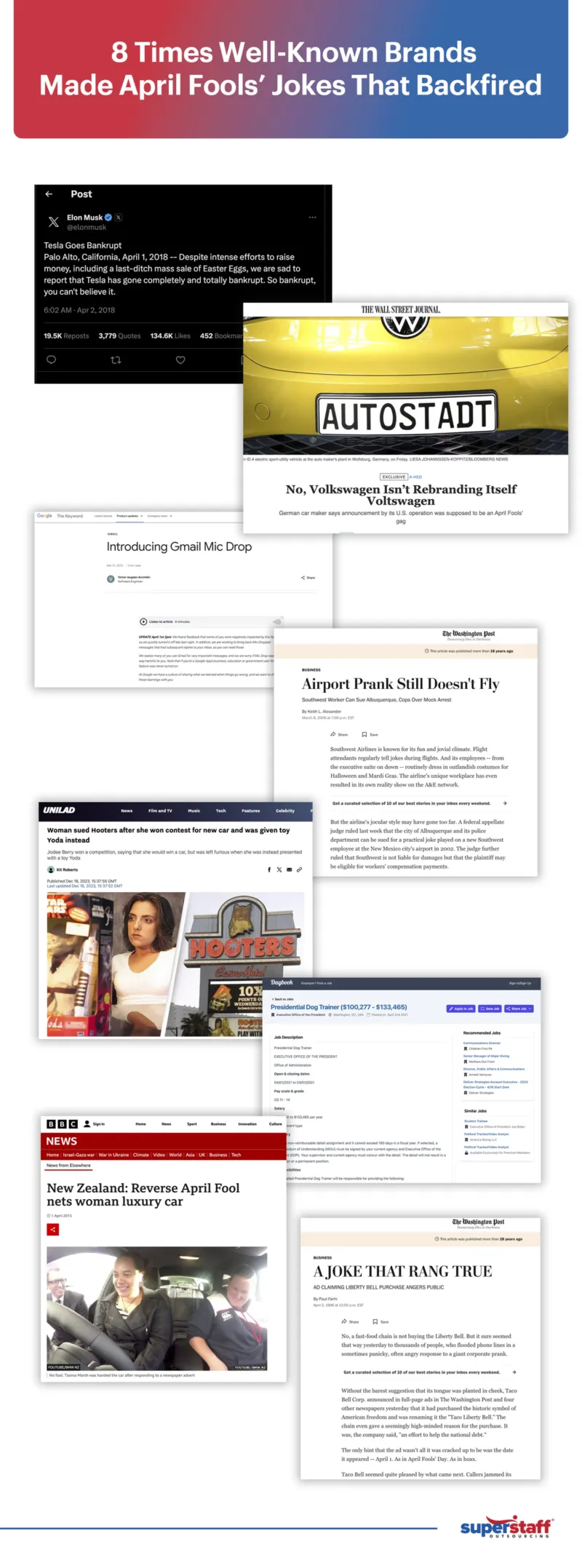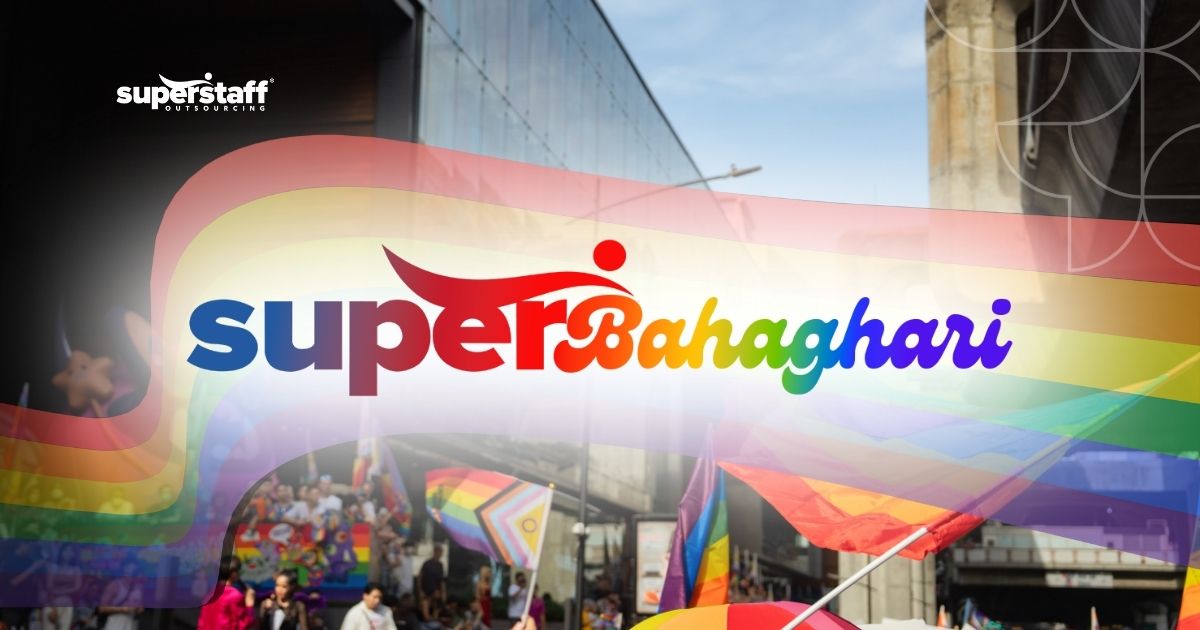
Viral marketing has become a powerful tool in every brand’s arsenal, helping companies capture the attention of existing and potential customers worldwide.
And for many brands, April Fool’s Day presents the perfect opportunity to pull off a fun and silly practical joke that will help them stand out in the sea of online content.
From the classic whoopee cushions prank to more elaborate stunts, viral marketers and aspiring influencers have shared all sorts of jokes and hoaxes on this annual occasion.
However, not all of these jokes have stuck the landing; some even damaged the reputations of the brands that shared them.
So, before you pull off any April Fools’ pranks, make sure to learn from the mistakes of these powerhouse brands.
8 Times Well-Known Brands Made April Fools’ Pranks That Backfired

Tesla Goes ‘Bankrupt’
On the first day of April 2018, Tesla CEO Elon Musk set the stage for an important announcement with a mysterious tweet promising big news about his electric car company.
A few hours later, he broke the internet by declaring that Tesla had “gone bankrupt.” He tried to inject humor into his tweet by referencing a “mass sale of Easter eggs” as a “last-ditch effort” to save his company.
What started as a silly April Fools’ Day prank quickly backfired on Elon Musk, causing a 7% drop in stock for Tesla.
Investors and shareholders also criticized his choice of a practical joke, claiming it was “inappropriate” because the company had already been experiencing hard financial times before his tweet.
Needless to say, Musk will unlikely be making another prank like this in the near future.
Volkswagen’s (Fake) Rebranding
On March 30, 2021, a few days before April Fools’ Day, the German car manufacturer Volkswagen shared a press release claiming they would rebrand their company to “Voltswagen.”
The company even changed its name on its U.S. website and updated its Twitter handle to make the practical joke feel real.
Multiple major news outlets fell for the prank, tricking CNN, The Washington Post, and NBC News.
Thankfully, The Wall Street Journal later confirmed that the announcement was just an early April Fools’ prank.
However, numerous journalists reacted quickly to the news, saying that the elaborate prank wasted their time and that the car company took things too far.
Google’s ‘Mic Drop’ Email Update
Google is no stranger to April Fools’ jokes. Before the pandemic, the tech company regularly inserted humorous animations, puns, and joke features into their products during this annual occasion.
However, one prank many users didn’t find amusing was the Gmail “Mic Drop” feature they implemented in April 2016.
According to their press release, the feature was meant to make it easier for people to “have the last word” in their emails. By using the button, they added an animated GIF of a minion (from the “Despicable Me” movies”), dropping a microphone to any email you send.
The problem is that the “mic drop” button was placed next to the actual “send” button, making it easy for people to accidentally click the GIF, even in serious conversations and business correspondences.
Because many users complained about the feature’s negative impact, Google quickly turned it off and issued a public apology.
Hooters Restaurant ‘Win a Toyota’ Contest
When is an April Fools’ prank funny, and when is it more harmful? A Hooters branch in Florida might have taken its practical joke too far – and ended up getting sued for it.
Back in 2001, a Hooters manager decided to celebrate April Fools’ Day by creating a “Win a Toyota” contest for their employees. The management team claimed that whoever sold the most beer that day would go home with a free Toyota.
One waitress, Jodee Berry, was the winner. However, instead of bringing home a new Toyota car, she was presented with a tiny “Toy Yoda,” a plastic action figure of the famous “Star Wars” character.
Upset by this turn of events, Berry quit her job and sued her employer for fraudulent misrepresentation and breach of contract. The case was settled, and she received enough money to purchase her own Toyota car.
Southwest Airlines’ Fake Employee Arrest
Here’s another April Fools’ prank that turned into a lawsuit: In 2002, Southwest Airlines Albuquerque went a bit too far in initiating a new employee who had just passed their probationary period.
A customer service agent named Marcie Fuerschbach was “arrested” by airport police officers (who were also involved in the prank set up by her supervisor and co-workers). The officers told her that something was discovered in her background check, and she was escorted away in handcuffs.
Once they exited the airport, her co-workers revealed the prank by applauding and yelling, “Congratulations on being off probation!”
However, Marcie cried and said she experienced significant trauma because of this prank. She later sued her employer for false imprisonment, assault and battery, and intentional infliction of emotional distress.
Southwest Airlines should stick to googly eyes and other harmless jokes next time.
Taco Bell’s Act of Liberty
Did you know that viral marketing was used before the social media age?
Way back in 1996, Taco Bell caught flack from American patriots by claiming that it had purchased and renamed one of the most well-known historical landmarks in Philadelphia: The Liberty Bell.
Taco Bell even went as far as to purchase full-page advertisements in multiple newspapers to announce that the beloved American relic had now been renamed “The Taco Liberty Bell.”
Of course, many people were displeased with this news, and hundreds of Americans called Taco Bell and the National Park Service (which houses the Liberty Bell) to express their anger.
The prank worked so well that members of Congress had to step in and confirm that the news wasn’t true.
After the anger died down, Taco Bell offered to donate $50,000 to the National Park Service, hoping to contribute to the upkeep and maintenance of the Liberty Bell.
The White House’s Dog Trainer Search
In 2021, the White House continued to celebrate April Fools’ Day by appealing to the pet lovers of America.
They started sowing seeds for the prank by sharing the big news story that one of President Joe Biden’s dogs, either Major or Champ, pooped in the hallway outside the Diplomatic Reception Room.
Then, by April, the White House posted a job listing promising to pay more than $100,000 yearly for a presidential dog trainer.
The job post ended with an all-caps “APRIL FOOLS!” but many job seekers (and pet lovers) were miffed to have lost the chance to apply for a lucrative opportunity.
BMW’s ‘Reverse Psychology’ Stunt
Like Google, BMW is another brand that loves making April Fools jokes.
Some of their funniest pranks include claiming that they created a sunroof so advanced that people could keep it open in the rain without getting wet or the time they announced a “Canine Repellent Alloy Protection (CRAP)” system that prevents dogs from peeing on car wheels.
However, their most infamous April Fools’ prank was when they pulled a “reverse psychology” move on their customers.
In 2015, BMW ran an ad campaign called “April Fool’s Day Special.” The ad promised that the first person who turned to their showroom with the advert in hand would win a brand-new BMW.
Naturally, people thought the deal was too good to be true and assumed it was just another prank. One woman, Tianna Marsh, took the company at their word and showed up at her nearest BMW dealership.
She was promptly rewarded with a brand-new BMW (just as the ad promised) with a license plate that reads “NOF00L.”
Even though this story didn’t backfire in the conventional sense, many people were upset that they didn’t win a new car because they’ve become too used to seeing brands not keep their promises or make misleading advertisements.
Follow SuperStaff for Relevant and Helpful B2B Content
Did you enjoy reading about these April Fools’ pranks that backfired spectacularly on big brands? There’s more where that came from. Subscribe to SuperStaff for helpful guides, articles, infographics, and other interesting B2B content.
SuperStaff is a reliable business process outsourcing (BPO) company with strategic locations in the U.S., the Philippines, and Colombia. With our vast experience working with organizations across industries, we have accumulated a wealth of knowledge that we’re excited to share with you.
Follow us on LinkedIn or browse our website for more fascinating information and articles relevant to the industry.






